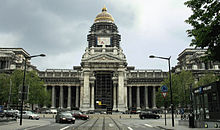
Back Kassationshof (Belgien) German Cour de cassation (Belgique) French Hof van Cassatie (België) Dutch Curtea de Casație (Belgia) Romanian Касациони суд (Белгија) Serbian
| Court of Cassation of Belgium | |
|---|---|
 The Brussels Palace of Justice is the seat of the Court of Cassation | |
 | |
| 50°50′12″N 4°21′06″E / 50.83667°N 4.35167°E | |
| Jurisdiction | |
| Location | Palace of Justice, Brussels |
| Coordinates | 50°50′12″N 4°21′06″E / 50.83667°N 4.35167°E |
| Authorised by | Constitution of Belgium Belgian Judicial Code |
| Judge term length | Life tenure |
| Number of positions | 30 |
| Website | justitie.belgium.be |
| First President of the Court of Cassation | |
| Currently | Beatrijs Deconinck |
| Since | 2019 |
| Lead position ends | 2024 |
| President of the Court of Cassation | |
| Currently | Ridder Jean De Codt |
| Since | 2019 |
| Lead position ends | 2024 |
 |
|---|
|
|
The Court of Cassation (Dutch: Hof van Cassatie, French: Cour de cassation, German: Kassationshof) of Belgium is the supreme court of the Belgian judiciary. The court is composed of thirty judges with life tenure who are nominated by the High Council of Justice of Belgium and appointed by the Belgian federal government. The court handles cases in the two main languages of Belgium, Dutch and French, and provides certain facilities for cases in German. The court is assisted in its work by a public prosecutor's office and a bar association, which both function separately from other structures. The duty of the public prosecutor's office is to provide advisory opinions to the court on how the law ought to be interpreted and applied. The attorneys of the court's bar association assist litigants in proceedings before the court; in certain cases, their assistance is mandatory.
The Belgian Court of Cassation was originally modelled after its French namesake, and its jurisdiction and powers are still very similar to those of its French counterpart.[pub. 1][pub. 2] The court is a court of cassation; meaning that it only hears appeals in last resort against decisions of lower courts and tribunals, and only on points of law. This means the Court of Cassation will not review or reconsider the findings of fact established by the lower court or tribunal. The jurisdiction of the court is limited to either upholding a decision that is contested, or annulling (quashing) it because it violated or misinterpreted the law. The latter is referred to as "cassation". By these means, the court is in effect the supreme interpreter of Belgian law, and as such ensures the nationwide uniform interpretation and application of the law by all other courts and tribunals of the Belgian judiciary.[pub. 1][pub. 2][1]
Generally speaking, the Court of Cassation only exercises supreme jurisdiction over judicial decisions, and thus does not hear appeals against administrative decisions (which is the realm of the Council of State of Belgium). The Court of Cassation also does not rule on the constitutionality of laws, which is the jurisdiction of the Constitutional Court of Belgium. However, some decisions of certain non-judicial bodies are within the purview of the Court of Cassation nonetheless. The court also settles jurisdictional conflicts which may or may not involve an administrative court. Furthermore, the court rules on certain prejudicial questions from other courts and on certain requests to review old criminal cases. Lastly, the court handles certain proceedings against judicial officers (magistrates; which encompasses judges and prosecutors in Belgian legal terminology), including recusal requests against a particular judge or prosecutor, requests to disqualify a judge or entire court, and requests to hold judges or prosecutors civilly liable for respectively judicial misconduct or prosecutorial misconduct. A ruling or judgment of the Court of Cassation is officially called an "arrest" (Dutch: arrest, French: arrêt, German: Entscheid).
An important aspect of the Court of Cassation is that it has no discretionary power to select the cases it hears, which means it must consider all cases correctly brought before it. The only filter that exists is the mandatory intervention of an attorney in certain cases. For this reason, the court handles a fairly large number of cases each year compared to some other supreme courts. For example, the court received about 2,500 petitions to initiate proceedings in 2019. A second aspect is that the court does not make public any individual opinions of its judges; it always issues one single ruling in each case. Lastly, the rulings of the court are only binding for the case at hand, and do not have the value of stare decisis. Lower courts are thus not officially required to adhere to the rulings of the Court of Cassation in earlier cases. However, the Court's rulings still have an important persuasive value for lower courts nonetheless; especially any so-called jurisprudence constante following from the court's case law.
Cite error: There are <ref group=pub.> tags on this page, but the references will not show without a {{reflist|group=pub.}} template (see the help page).
- ^ "Ordinary courts - Belgium". European e-Justice Portal. European Commission. Retrieved 28 August 2020.[permanent dead link]